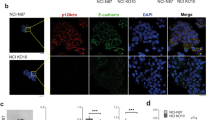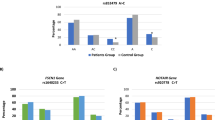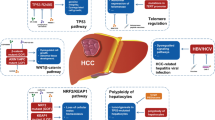Abstract
Purpose
Gallbladder cancer is a lethal malignancy of hepato-biliary system with high incidence in North India, especially along gangetic plain. The let-7 microRNAs play a key role in regulating KRAS expression and a polymorphism in 3′ untranslated region (rs61764370, T/G) of KRAS leads to its higher expression. This polymorphism is known to be associated with increased risk and prognosis of various cancers but its association with gallbladder cancer has not been evaluated. To address this research question, we evaluated whether rs61764370 variant is associated with gallbladder cancer susceptibility and clinical outcomes.
Methods
In present case–control study, we enrolled 541 patients with gallbladder malignancy and 307 controls. Genomic DNA was obtained from peripheral blood and genotyping was performed using Taqman allelic discrimination assay.
Results
Heterozygous (TG) individuals are at a significant higher risk for GBC as compared with wild genotype (TT) (p = 0.007, odds ratio = 2.56, 95 % CI 1.27–5.18). At allelic level, allele G has significant higher risk for GBC as compared with T allele (p = 0.008, odds ratio = 2.5, 95 % CI 1.25–5.01). Survival analysis reveals decrease in overall survival for heterozygous genotype (p < 0.0001, hazard ratio = 3.42, 95 % CI 1.21–4.20). Also, significant decrease in overall survival was observed for patient carrying allele G (p < 0.0001, HR = 2.89, 95 % CI 1.21–4.20) as compared with allele C.
Conclusions
We conclude that KRAS rs61764370 polymorphism is significantly associated with risk and prognosis of gallbladder malignancy in this endemic belt.

Similar content being viewed by others
References
Caiola E, Rulli E, Fruscio R, Buda A, Broggini M, Marabese M (2012) KRas-LCS6 polymorphism does not impact on outcomes in ovarian cancer. Am J Cancer Res 2(3):298–308
Cerne JZ, Stegel V, Gersak K, Novakovic S (2012) KRAS rs61764370 is associated with HER2-overexpressed and poorly-differentiated breast cancer in hormone replacement therapy users: a case control study. BMC Cancer 12:105. doi:10.1186/1471-2407-12-105
Chin LJ, Ratner E, Leng S, Zhai R, Nallur S, Babar I, Muller RU, Straka E, Su L, Burki EA, Crowell RE, Patel R, Kulkarni T, Homer R, Zelterman D, Kidd KK, Zhu Y, Christiani DC, Belinsky SA, Slack FJ, Weidhaas JB (2008) A SNP in a let-7 microRNA complementary site in the KRAS 3′ untranslated region increases non-small cell lung cancer risk. Cancer Res 68(20):8535–8540
Christensen BC, Moyer BJ, Avissar M, Ouellet LG, Plaza SL, McClean MD, Marsit CJ, Kelsey KT (2009) A let-7 microRNA-binding site polymorphism in the KRAS 3′ UTR is associated with reduced survival in oral cancers. Carcinogenesis 30(6):1003–1007
Cipollini M, Landi S, Gemignani F (2014) MicroRNA binding site polymorphisms as biomarkers in cancer management and research. Pharmgenomics Personal Med 7:173–191
Dai Q, Wei HL, Huang J, Zhou TJ, Chai L, Yang ZH (2015) KRAS polymorphisms are associated with survival of CRC in Chinese population. Tumour Biol 37(4):4727–4734
Dhir V, Mohandas KM (1999) Epidemiology of digestive tract cancers in India IV. Gall bladder and pancreas. Indian J Gastroenterol 18(1):24–28
Dutta U (2012) Gallbladder cancer: can newer insights improve the outcome? J Gastroenterol Hepatol 27(4):642–653
Ganzinelli M, Rulli E, Caiola E, Chiara Garassino M, Broggini M, Copreni E, Piva S, Longo F, Labianca R, Bareggi C, Agnese Fabbri M, Martelli O, Fagnani D, Cristina Locatelli M, Bertolini A, Valmadre G, Pavese Calcagno A, Giuseppa Sarobba M, Marabese M (2015) Role of KRAS-LCS6 polymorphism in advanced NSCLC patients treated with erlotinib or docetaxel in second line treatment (TAILOR). Sci Rep 5:16331. doi:10.1038/srep16331
Gupta S, Kori C, Kumar V, Misra S, Akhtar N (2016) Epidemiological study of gallbladder cancer patients from North Indian Gangetic Planes—a high-volume centre’s experience. J Gastrointest Cancer 47(1):27–35
Hollestelle A, Pelletier C, Hooning M, Crepin E, Schutte M, Look M, Collee JM, Nieuwlaat A, Dorssers LC, Seynaeve C, Aulchenko YS, Martens JW, van den Ouweland AM, Weidhaas JB (2011) Prevalence of the variant allele rs61764370 T>G in the 3′UTR of KRAS among Dutch BRCA1, BRCA2 and non-BRCA1/BRCA2 breast cancer families. Breast Cancer Res Treat 128(1):79–84
Johnson SM, Grosshans H, Shingara J, Byrom M, Jarvis R, Cheng A, Labourier E, Reinert KL, Brown D, Slack FJ (2005) RAS is regulated by the let-7 microRNA family. Cell 120(5):635–647
Kazmi HR, Chandra A, Baghel K, Singh A, Nigam J, Parmar D, Mahdi AA, Goel SK, Kumar S (2014) Differential expression of cholecystokinin A receptor in gallbladder cancer in the young and elderly suggests two subsets of the same disease? Biomed Res Int 2014:625695
Kim M, Slack FJ (2014) MicroRNA-mediated regulation of KRAS in cancer. J Hematol Oncol 7:84. doi:10.1186/s13045-014-0084-2
Manoharan N, Tyagi BB, Raina V (2010) Cancer incidences in rural Delhi—2004-05. Asian Pac J Cancer Prev 11(1):73–77
Nelson HH, Christensen BC, Plaza SL, Wiencke JK, Marsit CJ, Kelsey KT (2010) KRAS mutation, KRAS-LCS6 polymorphism, and non-small cell lung cancer. Lung Cancer 69(1):51–53
Ovarian Cancer Association Consortium, Breast Cancer Association Consortium, Consortium of Modifiers of BRCA1 and BRCA2, Hollestelle A, van der Baan FH, Berchuck A, Johnatty SE, Aben KK, Agnarsson BA et al (2016) No clinical utility of KRAS variant rs61764370 for ovarian or breast cancer. Gynecol Oncol 141(2):386–401
Paranjape T, Heneghan H, Lindner R, Keane FK, Hoffman A, Hollestelle A, Dorairaj J, Geyda K, Pelletier C, Nallur S, Martens JW, Hooning MJ, Kerin M, Zelterman D, Zhu Y, Tuck D, Harris L, Miller N, Slack F, Weidhaas J (2011) A 3′-untranslated region KRAS variant and triple-negative breast cancer: a case-control and genetic analysis. Lancet Oncol 12(4):377–386
Pelletier C, Weidhaas JB (2010) MicroRNA binding site polymorphisms as biomarkers of cancer risk. Expert Rev Mol Diagn 10(6):817–829
Pilarski R, Patel DA, Weitzel J, McVeigh T, Dorairaj JJ, Heneghan HM, Miller N, Weidhaas JB, Kerin MJ, McKenna M, Wu X, Hildebrandt M, Zelterman D, Sand S, Shulman LP (2012) The KRAS-variant is associated with risk of developing double primary breast and ovarian cancer. PLoS ONE 7(5):e37891
Ratner E, Lu L, Boeke M, Barnett R, Nallur S, Chin LJ, Pelletier C, Blitzblau R, Tassi R, Paranjape T, Hui P, Godwin AK, Yu H, Risch H, Rutherford T, Schwartz P, Santin A, Matloff E, Zelterman D, Slack FJ, Weidhaas JB (2010) A KRAS-variant in ovarian cancer acts as a genetic marker of cancer risk. Cancer Res 70(16):6509–6515
Sebio A, Paré L, Páez D, Salazar J, González A, Sala N, del Río E, Martín-Richard M, Tobeña M, Barnadas A, Baiget M (2013) The LCS6 polymorphism in the binding site of let-7 microRNA to the KRAS 3′-untranslated region: its role in the efficacy of anti-EGFR-based therapy in metastatic colorectal cancer patients. Pharmacogenet Genom 23(3):142–147
Shaffer EA (2008) Gallbladder cancer: the basics. Gastroenterol Hepatol (NY) 4(10):737–741
Yadav A, Gupta A, Yadav S, Rastogi N, Agrawal S, Kumar A, Kumar V, Misra S, Mittal B (2015) Association of Wnt signaling pathway genetic variants in gallbladder cancer susceptibility and survival. Tumour Biol 37(6):8083–8095
Zhu AX, Hong TS, Hezel AF, Kooby DA (2010) Current management of gallbladder carcinoma. Oncologist 15(2):168–181
Acknowledgments
The authors are thankful to the Council of Science and Technology, Government of Uttar Pradesh, Lucknow, India for financially supporting the study (Grant No. CST/SERPD/D-3429). Hasan Raza Kazmi is thankful to Indian Council of Medical Research, Government of India, New Delhi, India for providing fellowship (Grant No. 3/2/2/60/2011/NCDIII).
Funding
The study was funded by Council of Science and Technology, Government of Uttar Pradesh, India (Grant No. CST/SERPD/D-3429) and Indian Council of Medical Research, Government of India, India (Grant No. 3/2/2/60/2011/NCDIII).
Author information
Authors and Affiliations
Corresponding author
Ethics declarations
Conflict of interest
The authors declare that they have no conflict of interest.
Human and animals rights
All procedures performed in studies involving human participants were in accordance with the ethical standards of the institutional research committee and with the 1964 Helsinki declaration and its later amendments or comparable ethical standards.
Informed consent
Informed consent was obtained from all individual participants included in the study.
Rights and permissions
About this article
Cite this article
Kazmi, H.R., Chandra, A., Kumar, S. et al. A let-7 microRNA binding site polymorphism in the KRAS 3′UTR is associated with increased risk and reduced survival for gallbladder cancer in North Indian population. J Cancer Res Clin Oncol 142, 2577–2583 (2016). https://doi.org/10.1007/s00432-016-2254-9
Received:
Accepted:
Published:
Issue Date:
DOI: https://doi.org/10.1007/s00432-016-2254-9




